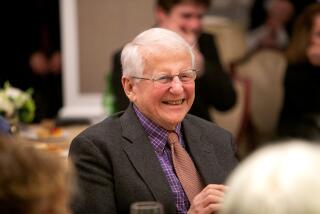Bard battles: ‘Contested Will’ by James Shapiro
Contested Will
Who Wrote Shakespeare?
James Shapiro
Simon & Schuster: 352 pp., $26
Shakespeare doesn’t lack for honors. A 2000 British survey named him the “man of the millennium.” He has been the subject of nine scholarly books or articles a day for the last half-century. Hundreds of millions have seen or read his plays. But there’s a problem. His fans can’t agree who he was or what he wrote. And they haven’t gotten much help from the American literary establishment, which is barred by layers of taboo from discussing authorship questions. Who wrote Shakespeare? is not a question to be asked by any Lit-department professor who wants tenure or a live audience of colleagues.
And it’s not just Shakespeare. When Roland Barthes proclaimed The Death of the Author in 1967, and the profession bought it, he taped off any authorship discussion, like a crime scene. Anyone who dares cross the first two police tapes would encounter a third: if you do talk about authorship, you had better do it the old way, by rereading and reinterpreting old texts and documents, not by new-fangled stylometric counting or crunching. These are still far outside the U.S. comfort zone, and likely to be dismissed as madness or idiocy.
Amateurs, however, adore Shakespeare. They have rushed in where the pros have feared to tread. Amateur anti-Stratfordian groups flourish today, and they point with pride to an all-amateur “honor roll” of distinguished Stratford skeptics, including Whitman, Twain, Henry James, Freud and many lawyers and Washington notables (including the reviewer’s father) and several Supreme Court justices.
The silence of the dons, however, hasn’t been complete. Some have made occasional remarks, while Alan Nelson and Steven May, leading authorities on the Earl of Oxford, have not been silent at all — they just haven’t been noticed by their peers. Thus James Shapiro’s “Contested Will: Who Wrote Shakespeare?” serves as the first full-length discussion of the big authorship question by a Shakespeare pro in 100 years, maybe the first ever.
It’s worth the wait. Shapiro is a powerful, engaging writer with a gift for connecting great generalities and illustrating them with telling examples. “Contested Will” explores the origin and development of the authorship question with unexpected openness and some insights that will be new even to the most seasoned of authorship buffs.
Among these insights is identifying Samuel Schmucker’s “Historic Doubts Respecting Shakespeare” (1848) as the first systematic statement of the case against the Stratford man. Schmucker laid down most of the stock arguments presented by anti-Stratfordians ever since. His book was not an attack on Shakespeare, however, but a lampoon of Higher-Criticism of the Bible, an object lesson on the absurdities that can arise when looking a sacred text in the mouth.
By Schmucker’s time, Shakespeare’s works had become sacred texts, thanks to changing fashions and the work of document hunters like Edmund Malone. Shapiro credits Malone as being the founding father of Shakespeare scholarship. But he also blames Malone for hailing Shakespeare as a demigod and overdoing the plays-as-autobiography theme. Who but an immortal, or at least a mortal of the very highest rank, could have written the sacred, self-revealing text? Surely not the grasping, barely literate grain dealer of anti-Stratfordian rhetoric!
As a 19th century Shakespeare scholar, Delia Bacon made many of the same points as Schmucker’s mock putdown of the Stratford man … but she believed them. She also offered Francis Bacon (no relation), along with other high-status figures such as Sir Walter Raleigh, as possible True Authors. Wouldn’t such giants make a better fit with the immortal poems and plays? Delia had passionate American followers who believed with new intensity that the plays must be drawn from life, and that the Stratford man was too prosaic to produce a play like “The Tempest.”
Eventually, as Francis Bacon’s own life became more studied, and more obviously at odds with the one inferred for Shakespeare, he, too, lost favor as a claimant. There are still Baconian websites to be seen, and an ongoing flow of books touting Bacon and many other candidates, but Edward de Vere, 17th earl of Oxford, has become the claimant to beat.
How did it happen? The first Oxfordian, John Thomas Looney (pronounced Loney), was as much interested in finding the True Shakespeare as in discrediting the false one. He drew up a list of characteristics inferable from the Canon, held it up as a template against every possible Claimant he could think of and announced in his “Shakespeare Identified,” 1920, that he had found his man in the Earl of Oxford.
“Shakespeare Identified,” like many subsequent books touting Marlowe, Bacon, and other Claimants, found scores of “uncanny” parallels between Oxford’s life and the poems and plays, and urgent reasons for him to have concealed his authorship. For years it was the Oxfordians’ Bible. It brushed aside contrary evidence, such as Oxford’s death in 1604, nine years before the last of Shakespeare’s plays was introduced. Surely, Looney argued, The Tempest (ca. 1611) couldn’t have been written by Shakespeare, and doesn’t belong in the Canon. Later Oxfordians have suggested (but never proved) that Shakespeare’s plays must have been written long before anyone mentioned them, or that Oxford, fearing persecution, must have faked his own death and continued to live and write under a double layer of pseudonymity.
From 1920 on, Oxford’s cause was warmly embraced by thinkers, including Freud and, later, by the elite lawyers and Washington notables. Shapiro argues that the 1973 Watergate cover-up created a bull market for conspiracy theories, breathing new life into wilder fancies: that Oxford was either Queen Elizabeth’s lover and the father, by her, of the earl of Southampton (rightful heir to the throne) or maybe he himself was Prince Tudor, Elizabeth’s secret son. The Oxford cause blossomed, Shapiro notes, “without the discovery of a single new document experts would accept that confirms Oxford’s claim or undermines Shakespeare’s!”
Shapiro adds one last plum to the pudding, a final chapter making the case for Shakespeare himself. He shows mention after mention of Shakespeare by contemporaries as the author of poems or plays in the canon, plus changes in style, content and musical embellishment in late plays written after 1610 for the upscale, indoors Blackfriars theatre, rather than for the outdoors Globe, and long after Oxford’s death. He even highlights a little-noticed author’s epilogue for a court performance of “Henry IV, Part II” that could not have come from an earl. All of these details are far more consistent with Shakespeare of Stratford than with Oxford, Bacon or any of the other high-born candidates.
We are much in Shapiro’s debt for acknowledging what most laypeople consider obvious: that authorship does matter and that the pros’ taboo against talking about it has a downside. We are in Shapiro’s debt for shrugging off protests from colleagues that he was wasting his time or else defecting to the dark side. We are also in his debt for a fresh, surprisingly sympathetic look at the Dark Siders themselves, for his keen eye for shaky assumptions that the Dark Siders picked up from the old establishment pros like Malone, and for his fresh, sprightly use of textual and documentary evidence to reconnect Shakespeare with the canon.
Will Shapiro change anyone’s mind? Probably not. The case for the claimants seems beyond recovery, yet few of the entrenched deniers seem bothered even by new evidence. Will even the Shakespeare establishment thank Shapiro for his landmark reaffirmation of orthodoxy? It’s doubtful. “Contested Will” is certain to have a very wide, admiring audience, but the establishment is also entrenched — and limited in its influence on the public. It stopped treating Shakespeare as a demigod at least 40 years ago and started treating him as a “dead white male,” even a bit of a bore as compared, say, with Rigoberta Menchú. The establishment has also categorically tabooed the authorship question — but the public seems not to have noticed or cared.
There are signs, though, that the establishment, no less than the deniers, has begun to rearrange its trenches, in several ways: more openness to new methods, more openness to co-authorship, less willingness to say it really doesn’t matter which is which. All these trends are for the better, and “Contested Will” seems destined to continue to expand them. Shapiro’s walk on the dark side has brought to it a lot of new light, yet still shown, at the end, that the deniers are on the wrong track. Whether this will slow or deflect them remains to be seen.
Elliott is the Burnet C. Wohlford professor of American Political Institutions at Claremont McKenna College and a former advisor of the Claremont Shakespeare Clinic, in which student-led teams use computer analysis to assess a variety of Shakespeare claimants.
calendar.latimes.com
More to Read
The biggest entertainment stories
Get our big stories about Hollywood, film, television, music, arts, culture and more right in your inbox as soon as they publish.
You may occasionally receive promotional content from the Los Angeles Times.






